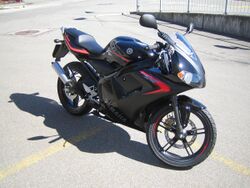Engineering:Sport moped
A sport moped is a moped that resembles a sport bike and often performs better than standard mopeds. They were created to circumvent UK legislation, called the "Sixteeners Laws", aimed at taking young motorcycle riders off the road. The new laws, introduced in 1971 by Conservative Party Minister for Transport John Peyton, forbade 16-year-olds from riding motorcycles of 250 cc (15 cu in) capacity, thus limiting them to 50 cc machines until they turned 17.[clarification needed]
Description
The law resulted in motorcycle manufacturers developing a new class of high-performance mopeds in the 1970s, termed "sports mopeds" or, colloquially, "sixteener specials," due to their marketing being aimed at 16-year-olds, a move which was widely criticized at the time.[1][unreliable source?][2][3]
If the speed limiter is removed, a four-stroke engine sport-moped can exceed 60 km/h (37 mph), while those with two-stroke engines can reach speeds of over 100 km/h (62 mph). To achieve higher performance, motorcyclists frequently modify the engines, such as installing a big bore kit which raises the displacement.[clarification needed] These engine modifications may increase maximum speeds to over 100 and 130 km/h (62 and 81 mph). Sport bikes with 125 cc displacements are sometimes registered as 50 cc mopeds to avoid certain state or federal regulations. Because of this, many manufacturers use identical frames and components in both 125 cc sport bikes and 50 cc sport mopeds, allowing a 125 cc engine to be swapped into a 50 cc sport moped frame. Examples of this are the Aprilia RS50 and RS125, the Derbi GPR50 and GPR125, the Yamaha TZR50 and TZR125, and the Gilera DNA 50 and 125.
Some sport bikes use the Minarelli AM6 engine (2T) (Aprilia RS 50 (1999-2005), Rieju RS2 Matrix 50, Peugeot XR6, Yamaha TZR 50, Malaguti Drakon 50), while other use Piaggio engines (Derbi GPR 50, and Gilera DNA).
Few sport bikes, for example: Gilera DNA and Kingway Fennari were produced with an automatic gearbox.
Bicycle-style pedals were installed when new legislation was passed requiring them.[citation needed] These models were produced from 1972 onwards by Japanese manufacturers Honda, Yamaha, and Suzuki, as well as European companies such as Puch, Fantic, Gilera, Gitane, and Garelli. The most famous of these versions was the Yamaha FS1-E.[4] They included roadsters, enduro and motorcrossers, cafe racers and choppers or Scooters,[5] and led to a boom in motorcycling similar to the early 1960s rocker period. The government passed further legislation in 1977 which was more restrictive, limiting mopeds to a weight of 250 kg (550 lb) and a top speed of 30 mph. This later legislation contributed to the decline of the UK motorcycle market.[6] No such restrictions existed in continental Europe, and such vehicles could be ridden by 14-year-olds.[6]
Sport mopeds, currently and formerly produced
On Chinese components
- Zipp Pro 50, Zipp Pro 50 GT, Zipp XRace 50
- Romet RR 50, Romet Arrow Fly
- Junak 901 RS, Junak 901 Sport, Junak 903 Race
- Keeway Leone RK50
- Kinroad Sprinter (also known as Kinroad XT50-18) / Ventus Sprinter
- Kingway Fennari
- Barton FR 50
- Pulse Rage 50 (also known as LK50GY-2)
- Yamasaki YM50
On Spanish, Italian, French and Japanese components
- Gilera DNA 50
- Aprilia RS 50 (four generations)
- Aprilia Tuono 50
- Aprilia AF1 50
- Derbi GPR 50
- Rieju RS1 Evolution 50, Rieju RS2 Matrix 50
- Peugeot XR6, Peugeot XR7
- Yamaha TZR 50
- Cagiva Mito 50
- Suzuki RG Gamma 50
- Malaguti Drakon 50
There are also Minibike sport mopeds; for example: Honda NSR50 and Yamaha YSR50.
References
- ↑ Letters; Saving Fuel, New Scientist, 4 November 1976. P.299
- ↑ Retail business, Issues 197202. Economist Intelligence Unit (Great Britain). Economist Intelligence Unit Ltd., 1974
- ↑ How to Restore Yamaha FS1-E, John Watts. Veloce Publishing Ltd, 14 June 2006
- ↑ James May's Magnificent Machines, James May, Phil Dolling. Hachette UK, 1 March 2012
- ↑ The Motorcycle Book, Alan Seeley, MotorBooks International, 2 May 2004
- ↑ 6.0 6.1 Funky Mopeds!: The 1970s Sports Moped Phenomenon, Richard Skelton. MBI Publishing Company, 1 May 2007. ISBN:1904788114
 |



